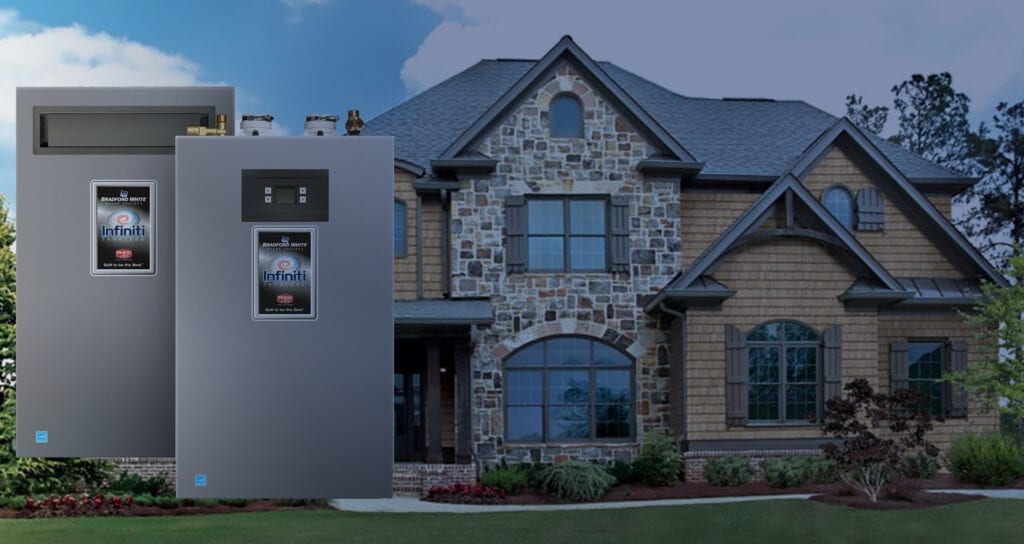Tankless water heaters, also known as On-demand or instant water heaters, have many advantages over traditional tank-style water heaters and can be an excellent long-term investment.
But they are not the ideal solution for every home.
Unlike traditional tank-style water heaters, which continuously use energy to maintain a hot water source, tankless water heaters only expend energy when you turn on a hot water tap or when you’re using appliances.
This on-demand style of operation results in the most critical advantage; energy and cost savings.
Besides energy and cost savings, there are several other reasons to select a tankless water heater on a traditional tank-style heater. Tankless water heaters produce an endless supply of hot water, take up less space, have a lower risk of leaking, are safer, and have a significantly longer lifespan typically.
The primary disadvantage of tankless water heater is their upfront cost (unit and setup ) is significantly higher than tank-style heaters. Including installation, tankless water heaters cost 3 times more than tank-style water heaters normally.
Besides high upfront costs, tankless Water heaters have several other disadvantages compared to tank-style water heaters:
- They take longer to deliver hot water
- The water temperature is inconsistent when multiple outlets are on at the same time
- They cannot provide hot water in a power outage
Investing in a tankless water heater is a Difficult decision, so it’s important to understand all of the facts before you make up your mind. In this guide, we provide an extensive list of the pros and cons of tankless water heaters so that you can make a well-informed decision based on your unique situation.
Long-term Energy and Cost Savings
The main advantage of Tankless water heaters is that they are energy efficient and save you money over the long term.
Expends energy around the clock to maintain the temperature of 40 to 50-gallon water supply so that hot water is ready when it’s needed.
Tankless water heaters, as their name suggests, heat water on-demand and don’t maintain a supply of water.
By only heating water when It is needed, tankless water heaters don’t experience standby heat loss, which occurs when heat escapes the water tank and needs constant reheating.
When a faucet, shower, or appliance is turned on, cold water passes through the tankless water heater where it is heated by either a gas-fired burner or electric coils.
Once the water is heated (this happens in seconds), the hot water travels through the pipes and outside the tap, showerhead, or any other outlet in your home.
So how much energy will you save?
Your energy savings Depends on the amount of water you use and the efficacy of your previous tank-style system.
According to the U.S. Department Of Energy, tankless water heaters may be between 8% and 50% more energy-efficient than tank-style water heaters, but the actual efficiency depends on the amount of hot water you use.
When using gallons of hot water daily, a tankless heater is 24%-34% more efficient than a tank-style heater.
Water, approximately 86 gallons per day, tankless water heaters are just 8% to 14% more effective as they are running more often.
Water heaters at every outlet (shower/sink) instead of a centralized system for your entire home, you can save even more; between 27% and 50%.
Switching from a Tank-style water heater to a tankless water heater will save a family of four an average of $100 per year or more than $1500 through the duration of the machine, based on Energy Star.
Here’s a Situation; you come home from a family beach day and everyone in the house should have a shower. With 5 showers in a row, the warm water is running low, and you are the one stuck taking a cold shower.
If you have a tankless water heater, you will never find yourself in that scenario. Let me explain.
Has a maximum flow rate; Quite simply, they’re only able to heat a specific quantity of water at a given time.
If you have 5 showers running simultaneously, most tankless heaters won’t be able to keep up.
Since tankless water heaters work by heating water in the external source on-demand, you could take a shower for 10 hours (or more ), and the water would be as hot as it would be to get a 10-minute shower.
Take Up Less Space
If space In your home is limited, tankless water heaters provide a massive benefit. They are generally mounted to the wall and take up less physical space compared to tank-style water heaters.
To give you an idea of how tankless and Tank-style water heaters compare in terms of size, the typical 40 to 50-gallon tank-style heater is 54 to 60 inches tall with a 20-inch diameter and is shaped like a cylinder.
The typical tankless unit is around 27 inches
Tank-style heaters take up floor space, usually in the basement, while tankless units are mounted to a wall like a circuit breaker and can fit in most closets.
Among the biggest risks With tank-style heaters is also as time passes, minerals from hard water build up inside the tank, which leads to corrosion and eventually leaks.
Since tankless water heater does not have a tank, there is no possibility of leaks or flooding.
This doesn’t mean that tankless water heaters are free from issues. They can and will encounter problems that could lead to leaking, but the chances of having a major leak that floods your entire basement and causes substantial damage are slim.
Tankless water heaters are safer than tank-style heaters.
Besides the fact that they do not have a tank that could explode, they also provide more precise control over the temperature so that you’re less likely to be burned by hot water.
Those minerals and particles eventually make their way into your water lines and expose your family to harmful toxins.
Since tankless water heaters do not maintain a supply of water in a corroding tank, the water they spread throughout your house is purer and safer on your skin.
Life Expectancy of Over 20 Years
Normally, tank-style Water heaters last between 8 and 12 years, however, tankless water heaters usually last over 20 years.
If you are already in your “forever home” or plan to remain where you are for some time, investing in a tankless water heater will save you from needing a replacement for a very long time.




